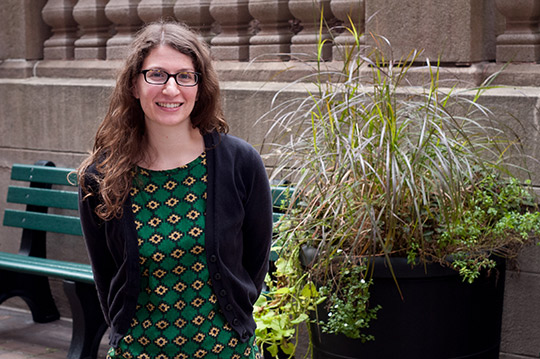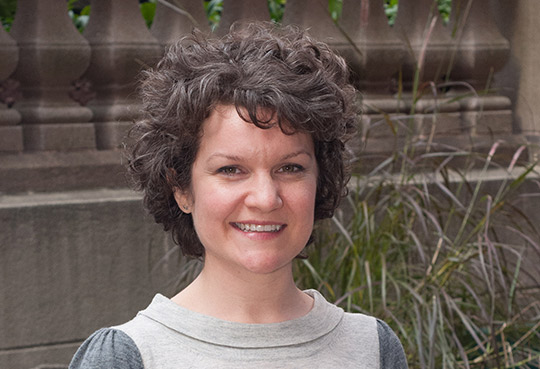The Food Network
Scholarship in Nutritional Ecology supports students who are planting seeds of change
Scholarship in nutritional ecology supports students who are planting seeds of change.
More than 40 years ago, before even experts saw the web of connections between the food system, the obesity and diabetes epidemics, and planetary ill health, Joan Gussow (Ed.D. ’75), the Mary Swartz Rose Professor Emerita of Nutrition & Education, developed a forward-thinking course at TC called "Nutritional Ecology.”
Gussow’s groundbreaking work in nutrition helped shape the history and politics of food in the United States, and she has been updating and teaching the course ever since. The honors Gussow by supporting master’s or doctoral students in the Nutrition Program with a demonstrated interest in studying the links between food, nutrition and ecology.
The scholarship was established in 2012 by Linford Lougheed (Ed.D. ’77) and is also supported by Valerie Cooke (Ed.D. ’87), Alison Rosenthal (M.S. ’08) and other former students of Gussow’s. “A generation of nutritional ecology scholars would definitely have an impact on education and policy,” Lougheed says. “There has to be an awareness of what good eating habits are so food outlets can be responsive to demands for nutritious food.” Lougheed, a bestselling author of test-preparation books who has trained teachers and helped English language learners prepare for proficiency exams like TOEFL, hopes to advance the influence of TC’s Nutrition Program.
Thus far, the scholarship has supported four TC students, including Katie Leonard and Carrie Russo (featured above, left to right).
Katie Leonard was working in New York City art galleries when she started volunteering at food programs and on a small farm in Brooklyn. She hauled compost, built raised beds for gardening, grew organic vegetables and learned about the sustainable food movement, which is about providing the type of locally sourced, healthy food that Gussow advocates.
“Teaching kids to grow food felt really important and meaningful to me,” Leonard says, “so I started looking at graduate programs. I didn’t want to just learn about the nutrients in food. I wanted to learn about the food system: what’s happening when the food is growing and what’s happening to the food in our bodies—and everything in between.”
Leonard’s work will include teaching children about the consequences of food choices. “We’re counting on those kids to make the right decisions to slow or stop or even reverse what we’re doing to our food system, our environment, and what we’re doing to our own bodies,” she says. “If kids grow up being aware of the connections, then the hope is they’ll make choices that help more than harm.”
The scholarship also supports doctoral student Carrie Russo, who is pursuing an interdisciplinary Ed.D. degree that combines nutrition and family and community education. Russo grew up in an Ohio suburb and remembers working in her backyard garden. Every summer her grandmother grew tomatoes and would line up a conventionally grown tomato, an organic tomato and one from her garden for the grandchildren to taste test. “You could always tell which one was hers,” Russo recalls. “They were delicious.”
“I think about how much my family influenced my ideas about food and nutrition,” says Russo, who volunteers with West Harlem Community Supported Agriculture. “How do you get families involved with farmers?” she asks. “How do you form a community around local, sustainable agriculture?”
Gussow’s Nutritional Ecology course has been a highlight of the students’ experiences at the College. “Everything is connected to food,” Russo says of Gussow’s influence on her work. “It’s critically important to develop a nutritional-ecology mind-set that looks beyond the current food system and to the future, to imagine new possibilities.”
Pamela Koch (Ed.D. ’00, M.Ed. ’98), Executive Director of the Tisch Center for Food, Education & Policy, has taught the course with Gussow for the last three years. Koch says whenever she speaks with alumni of the Nutrition Program it doesn’t take long for the course to come up. “‘Nutritional Ecology is where I learned to think,’” she says alumni tell her. “They say: ‘It changed how I live my life and the course of my career.’” Koch said the Nutritional Ecology Scholarship will “help Joan’s way of thinking live on through the work and research of our students.”
(Published 10//30/2014)
Published Thursday, Oct. 30, 2014

